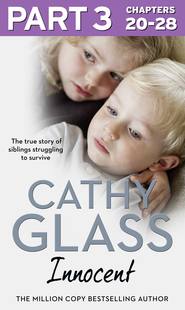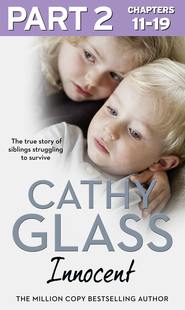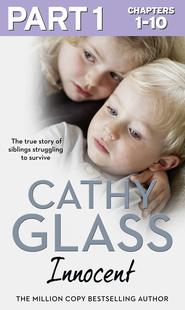По всем вопросам обращайтесь на: info@litportal.ru
(©) 2003-2024.
✖
The Child Bride
Настройки чтения
Размер шрифта
Высота строк
Поля
‘She’s treated like a slave at home!’ Lucy said, annoyed, once Zeena was in the bathroom and couldn’t hear.
‘I think she’s expected to do too much,’ I said. ‘I’ve raised it with Tara. Has Zeena said anything to you about abuse?’ I asked them both.
‘Not really,’ Paula said. ‘Just what her life is like at home and that she’s missing her brothers and sisters.’
‘I know. Tara’s hoping to arrange some contact soon. The child protection police officer is coming at five tomorrow,’ I reminded them, so that they wouldn’t be surprised when they walked in and found a stranger in the house.
When I went into Zeena’s room to say goodnight she was talking on her mobile. She cut the call as soon as I entered and I thought she looked almost guilty.
‘Is everything all right?’ I asked her.
‘Yes. It was just a friend,’ she said, not meeting my eyes.
Like many teenagers, Zeena spent a lot of time on her phone, texting, and sometimes she would leave the room to answer a call. However, I was slightly surprised to see a second mobile phone lying on her bed. ‘Lucky you. Two phones?’ I said, nonchalantly.
‘I don’t use that one, it doesn’t work properly,’ she said, and quickly pushed it under the pillow.
I thought no more about this at the time. It was later that I learned the horrific significance of that second phone.
DI Norma Jones’s visit the following day didn’t go well. Despite her being a very pleasant plain-clothed officer with a reassuring, confident manner, Zeena wouldn’t talk to her. When she arrived she asked to see Zeena alone, so I left the two of them in the living room and busied myself in the kitchen. When a younger child had to see a child protection officer I was usually asked to stay to help reassure them. Fifteen minutes later Norma came to find me. ‘Zeena isn’t able to tell me anything at present, so I’ll be going,’ she said. I could see she was disappointed.
‘Is Zeena upset?’ I asked.
‘No. But she won’t give me any details of her abuse or abuser, so there is very little I can do at present. I’ve done all I can to try to reassure her but she’s been scared into silence. We’ll keep the file open and hope that she’ll be able to tell me in time. She has my telephone number, but here’s my card if you need me.’
I took the business card, which had the police insignia in one corner and Norma’s rank, name and contact details beneath. ‘Thank you,’ I said. ‘I’m sorry you’ve had a wasted trip.’
‘It’s frustrating,’ she admitted. ‘I’m a hundred per cent certain she’s been badly abused, but with no evidence I can’t proceed. Tara told me about the run-in she had with her mother last night. I’ll be seeing both her parents soon. I take it Zeena hasn’t disclosed anything to you?’
‘No, I would have told Tara,’ I said. ‘Zeena talks about her family and all the work she’s expected to do, but that’s all.’
‘All right,’ Norma said, with a small sigh. ‘When she’s been here a while and feels safer she may start to open up.’
‘I hope so,’ I said.
I saw her out, and then checked on Zeena, who was still in the living room. She asked if it was all right if she went up to see Paula.
‘Yes, of course,’ I said.
Zeena looked sad and worried but wasn’t visibly upset. Like Norma, I, too, hoped that once Zeena felt more settled with me she would be able to talk.
I finished making the dinner and then called the girls. Adrian would eat later again, when he returned home from work. Zeena was quiet over dinner, but after we’d finished she went into the front room and to the computer with Paula and Lucy, as Lucy wanted to show them a website someone had recommended to her. Before long I could hear them all laughing and I went in to have a look at what was causing all the fun. It was a fashion website where a visitor could upload an image of themselves and then ‘try on’ different outfits. Lucy had uploaded a photograph of herself, where she was pulling a silly face and was now ‘trying on’ different designer outfits in various sizes. It was funny, and Zeena was laughing like the rest of us. Her ability to ‘switch off’ from the trauma she’d suffered was something I’d seen before in children I’d fostered who’d been badly abused. In order to function in everyday life, their brains compartmentalize their bad experiences and hive it off. It’s not healthy, and eventually the horror of what has happened comes to the surface, often with catastrophic results.
Chapter Six
Dreadful Feeling (#u59db0d86-5327-55b2-a880-7d5f28b5b6ba)
Zeena didn’t want to go out at all over the weekend, despite having her pocket money and allowance. She said that as most people didn’t work at the weekend they were likely to be out and about shopping, so she felt safer staying at home with me. She asked Paula if she would buy her more phone credit when she went out, and gave her the money from the allowance that I’d given to her.
I would normally have gone out at the weekend, taking any child I was fostering with me, but as Zeena hadn’t been with us for long and there were concerns about her safety I stayed in with her. The weather turned warmer so I did some gardening. Adrian, Paula and Lucy were in and out as usual, making the most of their time off. I didn’t expect them to change their plans for Zeena and neither did she. ‘Have a good time and thanks for getting my phone credit,’ Zeena said to Paula when she went shopping with her friends on Saturday afternoon.
‘You’re welcome,’ Paula said.
‘I hope you have a nice evening,’ Zeena called to Lucy when she went out all dressed up on both Saturday and Sunday evening.
‘Thank you,’ Lucy returned, slamming the front door behind her, late as usual.
Lucy’s, Adrian’s and Paula’s lifestyles were very different to Zeena’s, and I wondered if she resented the freedom my children enjoyed compared with the servitude of her life at home, but Zeena was such an unassuming and compliant child, I doubt it crossed her mind. She was also very humble and self-effacing, and I thought she could easily be taken advantage of. She spent most of Saturday trying to please me and kept asking me if there was anything she could do to help. I found her a few little jobs and then suggested she might like to cook – perhaps the chapris she’d mentioned? She liked the idea and I checked in the cupboard for the ingredients she needed and then texted Paula to ask her to buy what we didn’t have. On Sunday morning delicious smells came from the kitchen as Zeena cooked the chapris (savoury pancakes), leaving out the chilli from ours as we weren’t used to highly spiced food first thing in the morning. They were delicious and we all agreed we’d be happy if this became a regular occurrence. Zeena was pleased.
By the end of the weekend Zeena appeared to be more relaxed and had stopped asking me each and every time she wanted to do something, like have a glass of water or go to her room. However, despite her appearing to feel more at ease, she still hadn’t said anything of her abuse or suffering or the reason she’d asked to come into care, and I hadn’t brought up the subject. It was early days yet, and my role was to support and look after her. If and when she wanted to confide in me, as I hoped she would, then I would be ready to listen, but I wouldn’t be pushing her to do so. She knew she could talk to me any time and could also telephone Norma or Tara. Zeena was coping in her own way, but I did wonder how she could concentrate on her school lessons with so much on her mind. She’d had some homework to do over the weekend and from what I’ve seen she was achieving a high standard, despite everything. Perhaps school was a safe haven for her, as it was for many children with difficult home lives.
Having stayed in all weekend, security hadn’t been an issue, but on Monday morning I again asked Zeena if I could take her to school in the car. She said it wasn’t necessary, and that she would phone if she needed help, which I had to accept. I went with her to the front gate to say goodbye and also to check there were no strangers in the street. I reminded her to text me when she arrived at school, and before she left she gave me a hug and a kiss and thanked me for a nice weekend – although in truth we hadn’t really done anything. I watched her walk up the street until she was out of sight and then I returned indoors. If I entertained any thoughts that Zeena was exaggerating the threat to her safety, they vanished later that morning.
Dressed smartly in a blouse and skirt, I left the house twenty minutes later to drive to the council offices where the foster-carer training I was delivering was being held. Although the training wasn’t due to start until ten o’clock I wanted to arrive early to set up the PowerPoint presentation and generally organize myself with the handouts. Zeena texted confirming she’d arrived safely at school and I was pleased she’d remembered to let me know.
Carers began arriving at 9.45 a.m. and I greeted each of them as they entered, ticking their names off the registration sheet. When I’d fostered for Homefinders I’d been with them for so long that I knew most of the carers, but since changing to the local authority there were many I didn’t know. Not all carers attended every training session as the groups were limited in size, and sessions were repeated so that carers could choose a date that suited them and met their training needs. Ongoing training is now part of fostering and compulsory in the UK.
The carers, like students in a classroom, filled the chairs at the back of the room first, and began chatting to those they knew. A middle-aged Asian lady dressed attractively in a sari came in and I smiled at her, introduced myself and then ticked her name off the list. She sat alone at one of the front tables and watched me as I sorted through my paperwork. I smiled at her again and then she beckoned me over as though wanting to say something. I leaned forward so I was within earshot, and she said quietly, ‘Are you fostering Zeena?’
I drew back slightly and tried to hide my shock, but my mouth had gone dry and my heart was drumming loudly. ‘Pardon?’ I said, pretending I hadn’t heard.
‘Are you fostering Zeena P—?’ she said again. ‘She’s fourteen and has run away from home. Her parents are sick with worry. She needs to contact them and go home.’
‘No, sorry. I can’t help you,’ I said, forcing a small smile.
I picked up my notes and pretended to read them again as I fought to regain my composure. How on earth did she know Zeena was with me? And what was that about Zeena running away and not being in touch? Zeena had seen her mother on Friday and she’d been aggressive and rude to her. Yet clearly we were talking about the same child.
The last of the carers came in and I closed the door and tried to rein in my thoughts. Picking up my notes, I began by welcoming everyone to the training, and then went through what’s referred to as ‘housekeeping’, which includes where the fire exits are, a reminder to turn off mobiles, confidentiality and a timetable for the day. As I spoke I avoided meeting the woman’s gaze, although I felt her eyes on me. My heart was still racing and my hands felt clammy, but once I began the PowerPoint presentation and everyone was concentrating on the screen it became a little easier. I stood to the side of the room and allowed my gaze to wander as I talked. Who was the woman and how did she know Zeena? Was she a relative, a member of her extended family and part of the Asian network Zeena had spoken of? I had no idea, but I needed to find out. This could be a huge threat to Zeena’s security.
Somehow I got through the next two hours and then at noon I broke the training for lunch. I reminded everyone that they needed to return by one o’clock for the afternoon session, and slipping the registration list into my bag I left the room. I went upstairs to where the social workers had their desks. It was a large open-plan office and I looked around for Edith, my supervising social worker (sometimes called a link worker), but I couldn’t see her. I saw another social worker I knew and she looked over and smiled. I went to her desk. ‘I’m looking for Edith or Tara,’ I said.
‘Edith has gone on leave, but Tara should be around somewhere,’ she said.
She, too, scanned the room and at that moment the double doors swung open and Tara came in, carrying a stack of folders.
‘Thank you,’ I said, and went over.
‘Hi. What are you doing here?’ Tara said, greeting me with a smile.
‘I’m running some training today,’ I said. ‘But I need to ask you something.’ I took the registration list from my bag. ‘This lady, Mrs Parvin –’ I said, pointing to her name on the sheet. ‘Could she know I’m looking after Zeena?’
‘She certainly shouldn’t,’ Tara said, shocked.
I explained what had happened.
‘I’ll see her supervising social worker straight away and find out what’s going on,’ Tara said. ‘Everyone here who’s working on Zeena’s case knows her whereabouts are to be kept secret. Is Zeena at school?’
‘Yes.’
Другие электронные книги автора Cathy Glass
Innocent




 0
0











